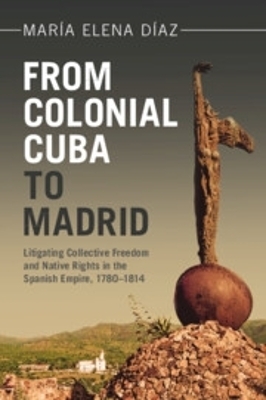
From Colonial Cuba to Madrid
Litigating Collective Freedom and Native Rights in the Spanish Empire, 1780–1814
Seiten
2024
Cambridge University Press (Verlag)
978-1-009-49422-9 (ISBN)
Cambridge University Press (Verlag)
978-1-009-49422-9 (ISBN)
This book examines freedom and native based rights through a unique collective suit filed by hundreds of Afro descendant litigants in colonial Cuba. Crossing various disciplines, it will interest students and scholars of the African diaspora, Afro-Latin America, slavery, the Spanish empire, legal studies, and the age of revolutions.
From Colonial Cuba to Madrid examines the largest and most complex freedom suit litigated in the highest court of the Spanish empire at the end of the eighteenth century. Filed by hundreds of re-enslaved Afro descendant people who had lived in quasi-freedom in eastern Cuba for more than a century, this action drew on local customary practices and broader cultural, political, and legal discourses rooted in the Spanish Atlantic world to put forward novel claims to collective freedom and native based rights at a time when questions of slavery, freedom, and citizenship were igniting in many parts of the Atlantic world. Intersecting law, society studies, and the history of slavery, María Elena Díaz offers a carefully researched study of one of the few communities of Afro descendants that managed to secure freedom and political and legal recognition from the Spanish crown during the colonial period.
From Colonial Cuba to Madrid examines the largest and most complex freedom suit litigated in the highest court of the Spanish empire at the end of the eighteenth century. Filed by hundreds of re-enslaved Afro descendant people who had lived in quasi-freedom in eastern Cuba for more than a century, this action drew on local customary practices and broader cultural, political, and legal discourses rooted in the Spanish Atlantic world to put forward novel claims to collective freedom and native based rights at a time when questions of slavery, freedom, and citizenship were igniting in many parts of the Atlantic world. Intersecting law, society studies, and the history of slavery, María Elena Díaz offers a carefully researched study of one of the few communities of Afro descendants that managed to secure freedom and political and legal recognition from the Spanish crown during the colonial period.
María Elena Díaz is Associate Professor of Latin American History at the University of California, Santa Cruz. She is the author of The Virgin, the King, and the Royal Slaves of El Cobre, 1670–1780 (2002), which was selected as an ACLS Humanities ebook.
Introduction; 1. Imperial reform, privatization, and enslavement; 2. An unorthodox pueblo and its apoderados; 3. Making the case for collective freedom; 4. Native bonds, native rights; 5. The council's ruling and the politics of litigation; 6. A 'pernicious' communication; 7. Violence, marronage, and litigation; 8. The final outcome of the case; 9. The nineteenth-century afterlife of the freedom edict of 1800; Conclusion; References; Index.
| Erscheinungsdatum | 13.11.2024 |
|---|---|
| Reihe/Serie | Afro-Latin America |
| Zusatzinfo | Worked examples or Exercises |
| Verlagsort | Cambridge |
| Sprache | englisch |
| Gewicht | 583 g |
| Themenwelt | Geschichte ► Teilgebiete der Geschichte ► Militärgeschichte |
| Geschichte ► Teilgebiete der Geschichte ► Wirtschaftsgeschichte | |
| Recht / Steuern ► Rechtsgeschichte | |
| ISBN-10 | 1-009-49422-8 / 1009494228 |
| ISBN-13 | 978-1-009-49422-9 / 9781009494229 |
| Zustand | Neuware |
| Haben Sie eine Frage zum Produkt? |
Mehr entdecken
aus dem Bereich
aus dem Bereich
neueste Manipulationstechniken als Waffengattung der NATO
Buch | Softcover (2023)
Westend (Verlag)
24,00 €
Deutschlands Schwäche in der Zeitenwende
Buch | Softcover (2023)
C.H.Beck (Verlag)
18,00 €


